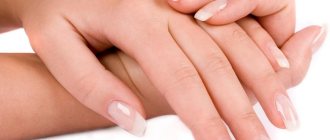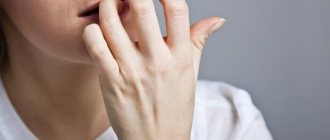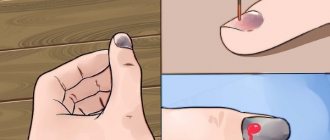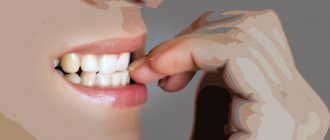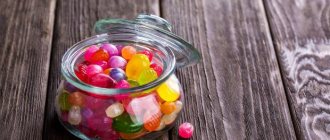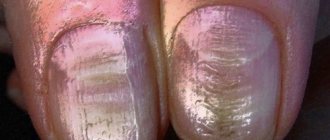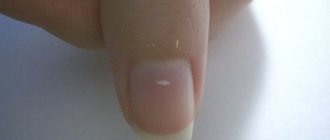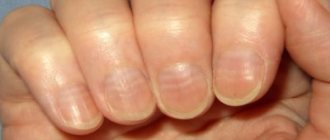Onychophagia, or nail biting, is a compulsive behavior. A person bites the free edge of the nail plate and adjacent soft tissues when he is nervous, worried, or does not know what to do with himself. Children are most often affected by the disease, but adults are often treated as well.
If you want to understand how to get rid of onychophagia of the nails, to understand what this symptom means for your mental state, call 8(969)060-93-93 . and make an appointment at the Leto clinic. We will offer you an effective therapeutic regimen that will help quickly eliminate the pathology.
Causes of mental disorder
The habit of biting nails occurs due to stress factors under the influence of certain psychological traits. Negative symptoms develop in response to:

- High level of anxiety. It is believed that people bite their nails because it helps them “relieve” nervous tension. Usually these are patients with low self-esteem who are not confident in themselves.
- A pronounced feeling of guilt. At the subconscious level, a person tries to punish himself for making a mistake. So he hurts himself. He may bite his nails “to the point of meat”, and then suffer from pain.
- Frequent family quarrels. An unfavorable situation in the family has a depressing effect on all its members. Everyone tries to deal with feelings as best they can and know how. For some, onychophagy is a way out of the situation.
- Difficulties in establishing social contacts. Unable to establish relationships with colleagues, superiors, relatives, and comrades, a person withdraws into himself and gets nervous a lot. At some point, he may become obsessive.
- Physical fatigue. Psychologists know of cases where fatigue found a way out through biting nails, which, of course, is not a normal option.
Psychosomatics
Many psychosomatic disorders in people appear under the influence of psychological factors, usually due to stress experienced or continued for a long time. Onychophagia and onychotillomania - biting nails and the skin around them, also do not arise out of nowhere. They are a reaction to stimuli or situations that occurred at an early age and “migrated” to the subconscious, or moved to the level of reflexes, already at a more mature age. In psychiatry, a condition in which a man or woman turns into a “rodent” is associated with obsessive-compulsive disorder - obsessive movement syndrome. That is why it is so difficult and ambiguous to identify the cause that served as a catalyst and help the patient overcome the harmful desire to “gnaw.”
Why does an adult man or woman, regardless of how unflattering he or she looks from the outside, selflessly bite his nails. What is the root of the problem? Let's consider the main “standard” cause-and-effect relationships leading to the development of this pathological habit:
- Even in diapers, many children begin to put their fingers in their mouth, but most parents do not attach importance to this, considering finger sucking a harmless infant habit that will pass when the child grows up. But for some kids, it only gets worse over the years and develops into a bigger problem. First in adolescence, and then in adulthood, they increasingly replace it with receiving psycho-emotional satisfaction from other sources.
The opinion of the father of psychoanalysis, Sigmund Freud, on onychophagia: “The formation of the habit of biting nails occurs as a result of insufficient satisfaction of the oral reflex in infancy.”
You can, of course, listen to Freud, or you may not agree, but the fact is that most of our habits come from childhood - in this he is 100% right.
- In most cases, the desire to bite your nails (still a habit) appears due to stress or nervousness associated with unhealthy relationships within the family. These can be constant conflicts, communication in a raised voice, quarrels, accusations for unintentional actions. According to a psychologist, a nervous “squabbling” child very often begins to torment himself for reproaches or comments from his parents. This is a kind of self-flagellation. Even when it seems that there is nothing exciting either in the family or in the child’s behavior, he himself may be disturbed by internal experiences. These are the most common cause of onychophagia.
- Further, already in adolescence, constant neuroses can become the cause of stress. Often, a nervous state occurs in schoolchildren who are overloaded with lessons and homework without a break for rest. In addition, it can be caused by non-compliance with the daily routine and lack of sleep. A teenager may also become nervous when his parents place excessive demands on him in his studies and constantly scold him. Or he himself wants to be better than others, and when faced with failures, he tries to overcome stress with the help of the habit of gnawing.
- Another fairly common cause of onychophagia is teenage stress associated with the crisis transition during puberty. It is no secret that active hormonal changes in the body cause nervous disruptions and provoke aggression towards others. In general, onychophagia and auto-aggressive behavior are strongly intertwined. A certain connection can be traced between the desire to dominate and the individual’s capabilities for certain actions, as well as the degree of their implementation. In this connection, the habit of biting nails becomes a “barometer” of emotional arousal.
- Uncertainty and low self-esteem, combined with an excitable nervous system, also in most cases become fertile ground for stress. Stress and depression, in turn, lead to the onset of involuntary “nail biting.” The percentage of people suffering from this disease who lack self-confidence is extremely high!
There is an opinion that onychophagy is inherited, but this is a far-fetched conclusion that has not yet been confirmed by facts. Most likely, when looking at the relationship between the transmission of this habit between parents and children, one can note the fact of copying behavior, and not the transmission of the disease through genes.
There are many scenarios in which people turn into slaves of their painful habits. Isolated, unique cases are also possible. But the ones described above are the most common. With competent and qualified help from a psychiatrist or psychotherapist, “rodents” can count on complete relief from their illness.
Read also: Which sleeping pills are compatible with alcohol
How a dangerous habit develops
Experts have found that the disease is based on a person’s inability to express their own feelings and emotions. He cannot honestly say what bothers him, what he doesn’t like. Hushing up problems, he bursts out. An internal tension is created that needs to be released. In order to somehow unload, the patient begins to bite and break off his nails.
Essentially, onychophagy is auto-aggression. Psychologists consider this condition to be very insidious. The patient harms himself and does not think about his own well-being. Adults do not know how to cope with stress, and this makes their life difficult and joyless.
The danger also lies in the fact that internal aggression and a tendency to self-blame often result in psychosomatic disorders. We are talking about diseases of internal organs and systems caused by long-lasting psychological discomfort.
Why do adults bite their nails?
According to statistics, onychophagia occurs to one degree or another in 15% of adults, and among women it is 3 times more common than among men.
According to a number of studies, it turned out that perfectionists are more prone to such a bad habit. If something does not go according to plan, then people striving for perfection get upset, nervous, and lose patience. And to cope with irritation, they bite their nails. And this applies not only to work, but also to personal, family life, relationships with friends.
Why do adults still bite their fingernails?
The reasons may be:
- Sudden nervous tension;
- Chronic stress;
- Feelings of fear and anxiety. In search of protection, adults return to childhood, remembering bad habits that helped cope with such conditions;
- Thinking about problems or important tasks. While people bite their nails, it is easier for them to concentrate and make decisions. Some people bite not their nails, but a pen cap or simply draw meaningless patterns on paper;
- Mental disorders that are accompanied by a desire to harm or injure oneself. Such people often chew their nails until they bleed, and may even eat the entire plate.
How does the violation manifest itself?

If the disease occurred a long time ago and no measures are taken to eliminate it, the nails thicken. Lumps and grooves and deep transverse/longitudinal stripes form on their surface. If a person bites the plate too deeply and an infection gets into the wound, pain, swelling, and itching occur. If a fungal infection occurs, the color of the nails changes - it becomes yellow, brown, orange, deep white or greenish.
Why is violation dangerous?
The problem is not only that others see what a person is doing and perceive it as strange. And it’s not even that hands with onychophagia look untidy. The consequences of mental illness extend much further. If treatment is not started, the following may soon develop:
- other obsessive-compulsive symptoms such as pulling out one’s own hair, frequent blinking, etc.;
- anxious and suspicious character traits, because of which the patient will become even more nervous;
- social maladjustment.
Onychophagia often results in helminthic infestations (after all, there are thousands of bacteria and dirt under the nails), damage to the front teeth, severe irreversible deformation of the nail plates, and malocclusion.
Who bites their nails more often - men or women?
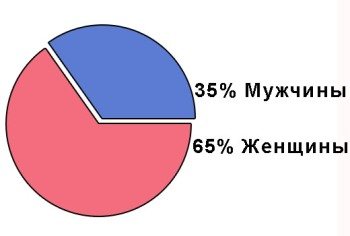
Statistics
Bitten nails create a problem not only for women who pay increased attention to their appearance, but also for men. Ungroomed hands create a repulsive impression and are in no way associated with a successful, self-confident person.
Onychophagia is widespread among both sexes, although everyone understands the negative consequences of the bad habit. According to statistics, approximately 65% of women bite their nails when they feel nervous at work. Among men, this figure is 35%.
Cleaners and ordinary workers are at risk. Due to their duty, such people have to use chemicals that can corrode the nail plate. In addition, they often do not have time to get a good manicure. As a result, teeth are often used instead of a nail file.
Diagnosis of onychophagia
The diagnostic stage includes:

- Survey, clinical conversation. It is important for the doctor to understand what caused the pathology.
- Inspection. In case of advanced disease, when there are wounds on the fingers, the nails are greatly modified, a consultation with a dermatologist is required. The specialist will select drugs that eliminate infectious and inflammatory phenomena and accelerate regenerative processes.
- Laboratory research. In case of progressive inflammation or suspicion of a viral or fungal disease, skin samples are taken and the composition of the exudate discharged from under the nails is analyzed.
- Psychodiagnostics. The psychiatrist conducts tests that allow us to study different aspects of the client’s personal and emotional sphere and assess the level of his neuroticism.
How onychophagia is treated at the Leto mental health center
Therapy is carried out in two directions at once. The first is designed to improve the condition of the nails. This is where medications prescribed by a dermatologist come to the rescue, for example, anti-inflammatory and antibacterial ointments, gels, solutions, and antifungal compounds.
The second is necessary to eliminate the root cause of obsessive actions. For this purpose, specialists at the Leto clinic conduct sessions:

- Individual psychotherapy. The doctor communicates with the patient alone. He establishes where aggression comes from and why a person cannot get rid of it. Teaches the skills of relaxation and constructive communication with others. Teaches how to defend your own position and adhere to your interests in any life situation.
- Cognitive behavioral therapy. It has been proven that onychophagia is a consequence of suppressed emotions and high levels of tension. The psychotherapist carries out extensive work with the client’s emotional sphere. He teaches him to discuss his dissatisfaction and demonstrates effective relaxation techniques. Step by step, the doctor ensures that the desire to bite nails is not associated with emotional discomfort.
For the treatment to be effective, the correct attitude of the patient is very important. If a person ignores medical prescriptions and refuses to confront his internal problems and psychological complexes, he cannot be helped.
When the problem is serious, where to turn?
A psychologist, neurologist, physiotherapist, and in rare cases a psychiatrist will help you cope with addiction to a bad habit.
It is necessary to explain to the doctor what causes the manifestation of this condition, when it began, and during what periods it manifests itself.
Together with a specialist, the causes of the disease and ways to eliminate it will be found..
A dermatologist can help treat damaged nails. Together with psychological correction, such treatment gives positive results.
Cost of services
| CONSULTATIONS OF SPECIALISTS | |
| Initial consultation with a psychiatrist (60 min.) | 6,000 rub. |
| Repeated consultation | 5,000 rub. |
| Consultation with a psychiatrist-narcologist (60 min.) | 5,000 rub. |
| Consultation with a psychologist | 3,500 rub. |
| Consultation with Gromova E.V. (50 minutes) | 12,000 rub. |
| PSYCHOTHERAPY | |
| Psychotherapy (session) | 7,000 rub. |
| Psychotherapy (5 sessions) | 30,000 rub. |
| Psychotherapy (10 sessions) | 60,000 rub. |
| Group psychotherapy (3-7 people) | 3,500 rub. |
| Psychotherapy session with E.V. Gromova (50 minutes) | 12,000 rub. |
This list does not contain all prices for services provided by our clinic. The full price list can be found on the “Prices” , or by calling: 8(969)060-93-93. Initial consultation is FREE!
Simple tips
Medication and therapy sessions can be combined with simple behavioral strategies.
- Our grandmothers also used this method - they smeared the child’s fingers with some bitter substance - aloe, hot pepper, etc. Now you can buy a special bitter varnish and cover your nails with it.
- Complex and expensive nail design. Most likely, a person will simply feel sorry for ruining a manicure on which he spent time and money.
- Chew gum. The mechanism of operation of this method is simple - the mouth is busy with chewing gum, so biting your nails will be simply inconvenient. Gradually, such a replacement can get rid of a bad habit.
If you have already used similar recommendations, but the obsessive desire to put your hands in your mouth remains, then seek advice from a specialist.
Sources:
Antropov Yu. F., Shevchenko Yu. S. Psychosomatic disorders and pathological habitual actions in children and adolescents.
Yu.S. Shevchenko PATHOLOGICAL HABITATIVE ACTIONS IN CHILDREN (CLINICAL, DYNAMICS, THERAPY).
How to prevent the development of onychophagia

Prevention of the disorder lies in the correct experience of negative emotions. A person must give vent to his anger and find ways to express it constructively. Anger and aggression need to be experienced. Under no circumstances should they be masked. Consultations with a psychologist, psychotherapy sessions, yoga classes, and relaxing massage will help with this.
The prognosis for onychophagia is favorable. As a rule, after a month or a month and a half, your nails begin to look healthy and your hands look well-groomed. Working with the psyche takes longer - up to six months. But it must be carried out, otherwise onychophagia will not disappear anywhere, and other mental disorders will join it.
Remember: there is no shame in treating an emerging disease. If you are faced with the habit of biting your nails, be sure to make an appointment by calling 8(969)060-93-93 . We will help you get rid of internal imbalance. As a result, the desire to bite your nails will disappear.
How to stop biting your nails?
It is difficult to cope with a habit that has accompanied you for many years, but the main thing is to sincerely want it. There are many ways. It is important to understand that the healing process will take time, so you need to be patient.
You can, for example, get an exquisite manicure, because it would be a pity to ruin it, apply bitter varnish, make a bet with someone, or make an appointment with a psychologist. Read more about ways to combat this bad habit further in our article.
More interesting articles:

